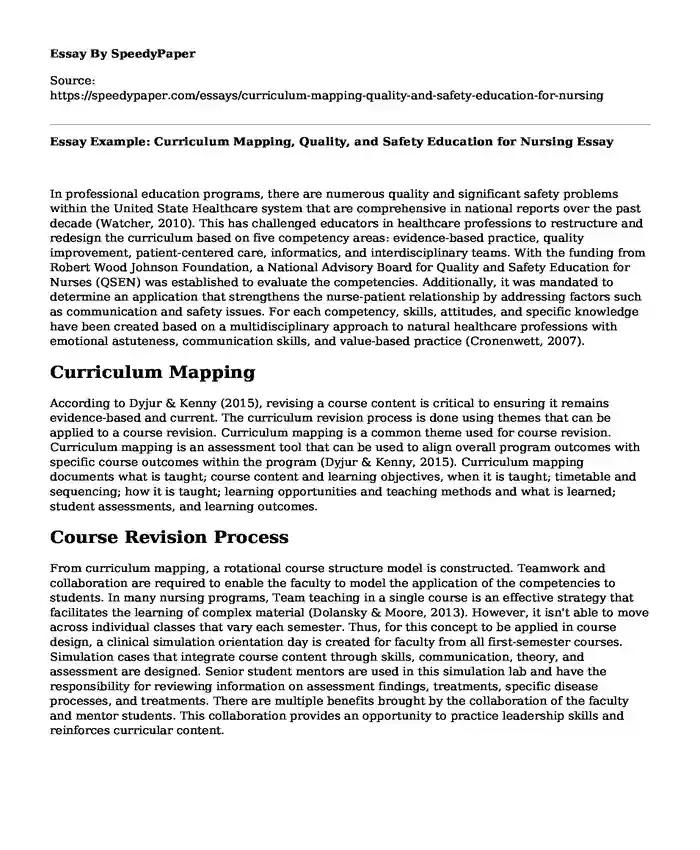
| Type of paper: | Research paper |
| Categories: | Knowledge Nursing Professional development Special education |
| Pages: | 3 |
| Wordcount: | 754 words |
In professional education programs, there are numerous quality and significant safety problems within the United State Healthcare system that are comprehensive in national reports over the past decade (Watcher, 2010). This has challenged educators in healthcare professions to restructure and redesign the curriculum based on five competency areas: evidence-based practice, quality improvement, patient-centered care, informatics, and interdisciplinary teams. With the funding from Robert Wood Johnson Foundation, a National Advisory Board for Quality and Safety Education for Nurses (QSEN) was established to evaluate the competencies. Additionally, it was mandated to determine an application that strengthens the nurse-patient relationship by addressing factors such as communication and safety issues. For each competency, skills, attitudes, and specific knowledge have been created based on a multidisciplinary approach to natural healthcare professions with emotional astuteness, communication skills, and value-based practice (Cronenwett, 2007).
Curriculum Mapping
According to Dyjur & Kenny (2015), revising a course content is critical to ensuring it remains evidence-based and current. The curriculum revision process is done using themes that can be applied to a course revision. Curriculum mapping is a common theme used for course revision. Curriculum mapping is an assessment tool that can be used to align overall program outcomes with specific course outcomes within the program (Dyjur & Kenny, 2015). Curriculum mapping documents what is taught; course content and learning objectives, when it is taught; timetable and sequencing; how it is taught; learning opportunities and teaching methods and what is learned; student assessments, and learning outcomes.
Course Revision Process
From curriculum mapping, a rotational course structure model is constructed. Teamwork and collaboration are required to enable the faculty to model the application of the competencies to students. In many nursing programs, Team teaching in a single course is an effective strategy that facilitates the learning of complex material (Dolansky & Moore, 2013). However, it isn't able to move across individual classes that vary each semester. Thus, for this concept to be applied in course design, a clinical simulation orientation day is created for faculty from all first-semester courses. Simulation cases that integrate course content through skills, communication, theory, and assessment are designed. Senior student mentors are used in this simulation lab and have the responsibility for reviewing information on assessment findings, treatments, specific disease processes, and treatments. There are multiple benefits brought by the collaboration of the faculty and mentor students. This collaboration provides an opportunity to practice leadership skills and reinforces curricular content.
QSEN's Significance in BSN Programs
QSEN addresses the task of preparing future nurses with the Knowledge, Skills, and Attitudes (KSAs). KSAs are essential to improve the safety and quality of the healthcare systems continuously. In the 21st century, nurses face numerous challenges in their line of work. One major problem relates to nursing education is precisely to practice the preparation of nursing students. For years, nursing education programs are based on preparing nurses for the day without planning for the future.
Recommendation Change in Curriculum
To respond to increasing QSEN competencies, IOM suggests future nurses be educated in ways that meet the complex population needs. A specific criterion in entry in BSN programs is now used in all US states. Nursing students under BSN must achieve a passing score that satisfies the National Council Licensure Examination (Lavin & Rosario, 2013). Nursing courses in the BSN program are offered under a combination of laboratory practice, lectures, and clinical training.
Nurses not only need the KSAs but need to have intensive practical skills to move their profession into the 21st century. This practice is a shared responsibility. Integrating QSEN in the revised curriculum plays a dynamic role in the future of nursing globally. QSEN equips aspiring nurses with the necessary tools to meet the complexities of healthcare.
References
Cronenwett, L., Sherwood, G., Barnsteiner, J., Disch, J., Johnson, J., Mitchell, P., Sullivan, D., & Warren, J. (2007). Quality and safety education for nurses. Nursing Outlook, 55, 122-131. Retrieved from https://www.sciencedirect.com/science/article/pii/S0029655407000620
Dolansky, M. A., & Moore, S. M. (2013). Quality and safety education for nurses (QSEN): The key is systems thinking. Online Journal of Issues in Nursing, 18(3), 1-12. Retrieved from https://gedube.ga/595622_doc.pdf
Dyjur, P., & Kenny, N. (2015). Analyzing curriculum mapping data: Enhancing student learning through curriculum redesign. PRISM Retrieved from https://prism.ucalgary.ca/handle/1880/50575
Lavin, J., & Rosario-Sim, M. G. (2013). Understanding the NCLEX: How to increase success on the revised 2013 examination. Nursing Education Perspectives, 34(3), 196-198. Retrieved from https://journals.lww.com/nsca-jscr/00024776-201305000-00014.fulltext
Watcher, R. (2010). Patient safety at ten: Unmistakable progress, troubling gaps. Health Affairs, 29(1), 1-9. Retrieved from https://www.healthaffairs.org/doi/abs/10.1377/hlthaff.2009.0785
Cite this page
Essay Example: Curriculum Mapping, Quality, and Safety Education for Nursing. (2023, Mar 28). Retrieved from https://speedypaper.net/essays/curriculum-mapping-quality-and-safety-education-for-nursing
Request Removal
If you are the original author of this essay and no longer wish to have it published on the SpeedyPaper website, please click below to request its removal:
- Free Essay on Literature Review Strategies
- Ethanol Fuel Research Essay Sample
- Free Essay on Physical, Psychosocial and Cognitive Development
- Anti-Bullying Essay Sample for Free Use
- Student's Self Assessment Essay Sample
- Environmental Conditions in Germany and India - Paper Example
- Essay Example on Civil Rights Movement: The Revolution of Equality in America
Popular categories




